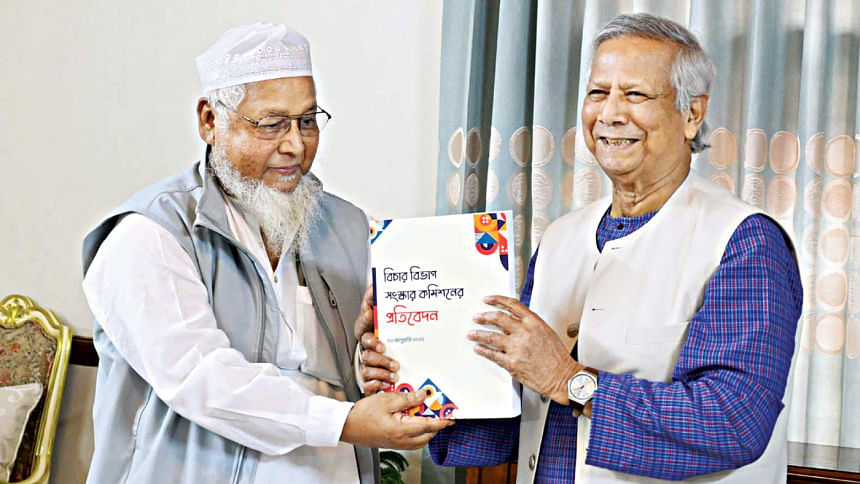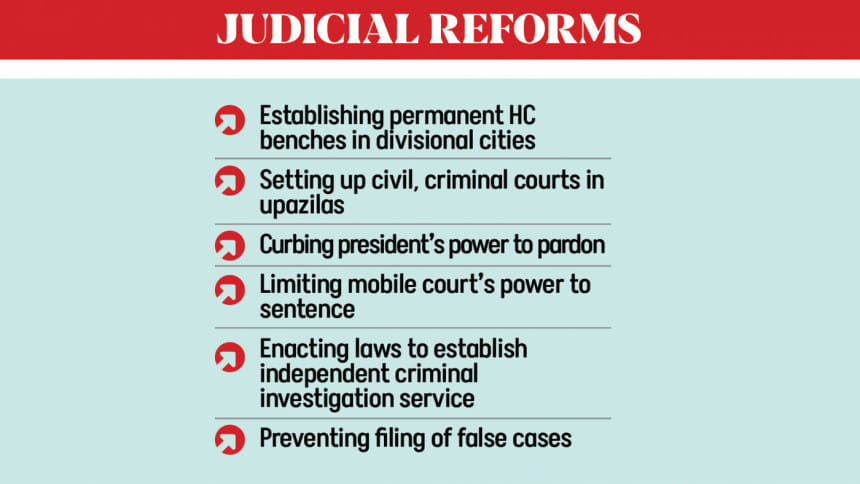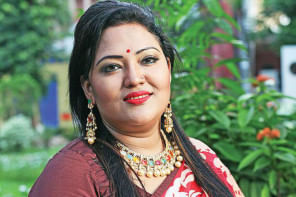Reform recommendations: Decentralised judiciary at the core

The Judiciary Reform Commission recommends curbing the president's power to pardon convicts and establishing permanent High Court benches at every divisional city.
It also proposes establishing civil and criminal courts at upazilas; reducing the mobile court's jurisdiction in sentencing; formulating legislation to establish an independent criminal investigation agency; and preventing filing of false cases with a law.

The reforms are proposed in 28 areas.
The commission led by Justice Shah Abu Nayeem Mominur Rahman handed over the 380-page report to Chief Adviser Prof Muhammad Yunus yesterday.
Chief Adviser's Press Secretary Shafiqul Alam told reporters that the judiciary was not fully independent under the previous government.
"That's why the Judiciary Reform Commission proposes making the judiciary fully independent," he said.
The reform commission proposes amending the constitution so that the most senior judge of the Appellate Division gets to be the chief justice; forming a nine-member commission led by the chief justice for appointment of Supreme Court judges; fixing the number of the Appellate Division judges at seven; raising the judges' retirement age to 70, up from 67; setting the minimum age for judges at 48; and increasing the number of judges in the higher and lower courts.
Currently, the Appellate Division has five judges including the chief justice while the High Court division has 94. Seven of the HC judges have been kept away from judicial proceedings since demonstrations on the SC premises on October 20 last year.
There are around 2,100 lower court judges across the country, SC sources said.
The number of cases pending with the courts across the country is at 44.43 lakh.
The interim government on January 21 this year issued an ordinance for recruitment of judges in the SC through a seven-member Supreme Judicial Appointment Council led by the chief justice.
The council will look into the candidates' educational qualifications, professional skills, experience, publications, training; criminal record; special knowledge and skills in a particular area of law; overall knowledge, wisdom, honesty, reputation, and other matters, says the ordinance.
The reform commission proposes establishing a six-member board led by the attorney general to regulate the absolute power of the president; and amending the criminal laws to enhance judicial magistrates' powers.
The commission suggests giving powers to the Supreme Judicial Council (SJC), which comprises of the chief justice and two senior most judges of the Appellate Division, to voluntarily investigate judges facing allegations; establishing an SC secretariat for full independence and separation of the judiciary; and forming a permanent and independent attorney service to appoint impartial prosecutors.
It also proposes that mobile courts run by the judicial magistrates can only slap financial penalties, not prison sentences.
The commission recommends formulation of a code of conduct to prevent corruption by judges of all courts.
Every three years, the property details of the SC and lower court judges and employees should be uploaded to the internet.
It also proposes appointing a retired, honest, and efficient district judge for a period of two to three years in the districts where a large number of criminal appeals, criminal revisions, civil appeals and civil revisions are pending.
Besides, witnesses should be allowed to testify through the internet.
It recommends more budget allocations for the financial independence of the judiciary.
To instill moral values in the society to reduce crimes, arrangements should be made to impart moral education at different levels of society, schools, colleges and religious institutions.
Tanim Hussain Shawon, a member of the reform commission, told The Daily Star that the commission held 29 meetings among themselves and 37 meetings with stakeholders before making the recommendations.
Around 15,000 people, including commoners, lawyers, judges and others gave their views on reforms to the commission so far, he added.
The eight-member Judiciary Reform Commission was formed on October 3 last year.
Members of the commission include retired HC judges Justice Emdadul Haque and Justice Farid Ahmed Shibli; former registrar general of the SC Syed Aminul Islam; former district and sessions judge Masdar Hossain; Dhaka University Associate Professor Kazi Mahfuzaul Haque Supan; and a student representative.

 For all latest news, follow The Daily Star's Google News channel.
For all latest news, follow The Daily Star's Google News channel. 



Comments